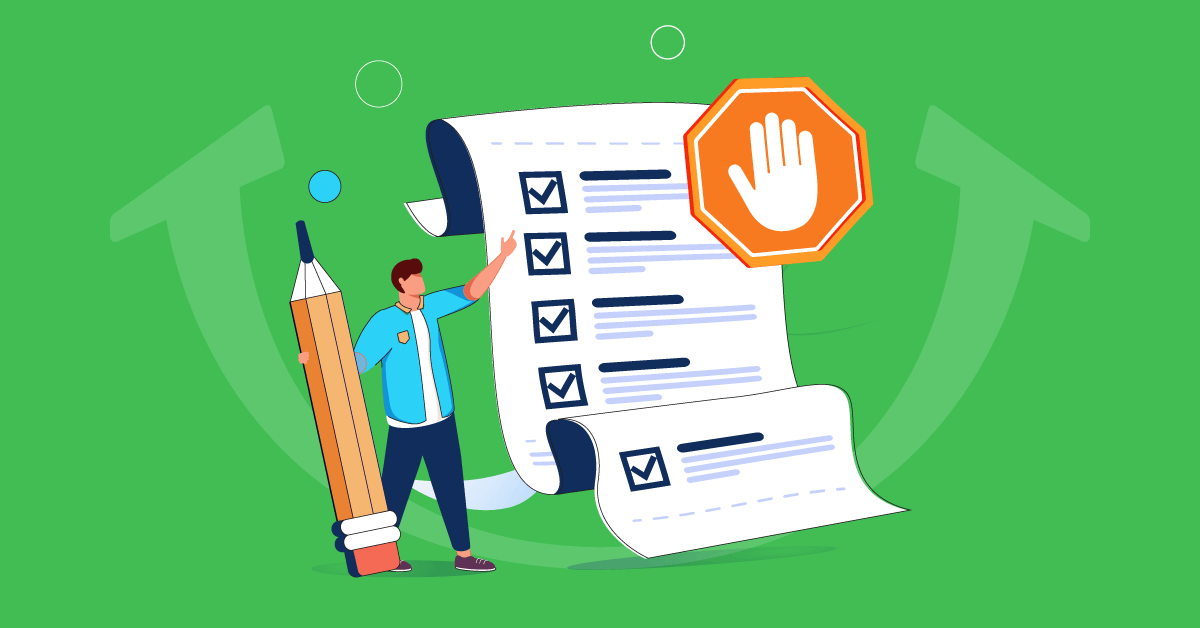For a concept designed to keep teams and any organization secure, compliance training can sometimes be intimidating for leadership.
Where do you start? How can you be absolutely sure you’ve covered every critical aspect in your compliance training courses? The last thing you want is to overlook a detail and end up facing steep fines, penalties, or even legal consequences that could cost you your job or damage your company’s reputation.
The core of workplace compliance and mitigated risk lies in training. It’s complex, varying by industry and location, but the basic principles remain consistent.
In this article, we’ll explore the A-Zs of compliance training and how to use the right software to create effective compliance courses, which can help you avoid the exacting penalties of noncompliance.

What is compliance training?
Compliance training educates employees on following laws, rules, and ethical standards. Its core aim is to reduce legal, ethical, and business risks. Depending on the organization’s needs, it covers various topics like workplace harassment, data security, and more. This type of training includes mandatory courses and assessments to ensure compliance.
Several types of compliance training exist, from ethics and DE&I to cybersecurity, each covering specific content to help keep employees and companies safe and up to date.
Employee compliance training is essential for legal adherence, ethical conduct, security, and overall organizational well-being. More specifically, corporate compliance training is important because it helps minimize legal risks, promote ethical behavior, boost security, support reputation, prevent costly errors, encourage consistency, and empower accountability.
Compliance training programs: What to include
Crafting a robust compliance training program is vital for all organizations.
According to industry standards and other organizational requirements, compliance training programs should include a variety of training topics to be effective in minimizing risks.
- Data privacy and protection: Safeguarding sensitive information, ensuring compliance with data protection laws (e.g., GDPR), and maintaining the confidentiality and integrity of data.
- Cybersecurity: Protection of digital assets, cybersecurity measures, and protocols to prevent data breaches and cyberattacks.
- Anti-discrimination: Promotes a respectful and inclusive workplace by educating employees on anti-discrimination laws and ethics.
- Harassment prevention: Focuses on preventing and addressing harassment issues to maintain a safe and supportive work environment with anti-harassment training.
- Workplace safety: Occupational health and safety regulations, preventing accidents, and using safety equipment effectively.
- Financial regulations: Compliance with financial laws and regulations, including those related to accounting, taxation, and financial reporting.
- Environmental laws: Education on the organization’s responsibilities regarding environmental protection, waste disposal, and sustainability practices.
- Healthcare compliance: Adherence to healthcare laws like HIPAA, regulations, and ethical standards that focus on patient privacy, quality of care, and billing practices.
- Anti-bribery and corruption: Laws and regulations related to preventing bribery, money laundering, and corrupt business practices.
- Ethical conduct: Ethical decision-making, integrity, and social responsibility to promote a culture of honesty and ethics.
- Quality control (mostly in manufacturing and pharmaceuticals): Quality control standards and adherence to product safety regulations.
- Supplier and vendor compliance: Ensuring that the organization’s supply chain and third-party partners follow ethical and compliance standards.
- Regulatory changes: Updating employee knowledge on changes in federal laws and regulations that affect the organization in staying compliant.
Examples of compliance training
There are several different corporate compliance training examples, but the below are the most widespread:
DE&I training
Diversity, Equity, and Inclusion training is quickly becoming a priority and an integral part of HR compliance training. And understandably so.
Work environments where many employees can thrive and where biases (conscious or unconscious) are eliminated are in everyone’s best interest. In fact, a commitment to DE&I makes a difference when attracting talent. According to a Glassdoor survey, 76% of job seekers see a diverse workforce as an important factor when evaluating companies and considering job offers.
DE&I training addresses soft skills such as self-awareness and cultural sensitivity. At the same time, it focuses on how equity impacts the ways employees collaborate and co-exist in a workspace. Note that this type of training should be offered to management and leaders as well as to your staff.
Cybersecurity training
When it comes to cybersecurity and privacy, there are certain things that are industry-specific, while others are mandated (for example, the GDPR requirements in the EU.) Legislation around the handling of data and other sensitive information can be quite rigorous—and it’s important that your employees follow it, along with the best cyber practices.
Even if it’s mandatory, cybersecurity training shouldn’t be just a box you have to tick. Especially because, as a TalentLMS survey shows, employees may fail even a basic cybersecurity test despite the fact they’ve received training and think they know how to respond to cyber threats.
Health & safety training
Compliance in the workplace also translates to an environment that’s physically safe for both your employees and your clients.
Health and safety compliance training focuses on eliminating workplace hazards that can cause injuries, accidents, and illnesses—saving you money and keeping productivity levels high along the way.
Although there are specific standards you need to adhere to (for example, the OSH Act of 1970 in the US), your health and safety training will differ a bit based on your industry and work environment. For example, you might need to train employees how to handle potentially dangerous substances or machinery. Or, if your industry is relatively low-risk, your training could focus more on things like office ergonomics.
Harassment and sexual harassment training
Harassment training is essential for creating a respectful, inclusive workplace. Sexual harassment training specifically addresses behaviors and boundaries that help maintain a safe environment for all employees. This training informs employees about their rights and responsibilities and how to recognize and report inappropriate behavior in the organization. Plus, it should align with relevant laws like Title VII of the Civil Rights Act and the Equal Employment Opportunity Commission’s (EEOC) guidelines on sexual harassment.
By focusing on anti-harassment policies and ensuring compliance with these laws, this training enables your organization to protect itself from legal risks while fostering a culture of respect. It also boosts employee morale by promoting safety and accountability. Tailored to fit your industry, sexual harassment and harassment training are critical tools for building a healthy, positive workplace environment.

TalentLibrary – Skills that matter, courses that deliver
With TalentLibrary, you set the foundation for a strong, aligned workforce—soft skills, compliance, and workplace essentials, from day one (and beyond).
How to deliver an engaging compliance training program
Let’s be honest, mandatory compliance training probably won’t inspire the most excitement in your workforce. So, to keep your people from zoning out, it’s crucial to create engaging online compliance training courses for employees to help learners understand and retain the information.
This way, compliance training becomes an engaging, interactive, and effective learning experience. It not only fulfills legal and ethical requirements but also contributes to a culture of integrity and responsibility within the organization.
Use interactive learning elements
Incorporating interactive elements into your compliance training courses helps make compliance training programs more engaging. Real-life scenarios (situations or activities that mimic actual experiences in a realistic context) engage employees by presenting practical challenges they might encounter. Interactive content, like quizzes and simulations on your compliance training tool, boost active participation and critical thinking.
Gamification in your workplace training programs adds an element of friendly competition through leaderboards, badges, and rewards. Last, role-playing activities allow learners to practice applying compliance knowledge in realistic situations, fostering hands-on learning and skill development.
Focus on training delivery
The way workplace training is delivered plays an important role. In-person training with live sessions with skilled facilitators helps engage participants in discussions and answers questions. Online training allows employees to complete interactive modules, quizzes, and scenarios at their own pace on TalentLMS.
The optimal training delivery is a combination of methods as it boosts flexibility, caters to different learning styles, and helps with knowledge retention. For example, in-person training can prove to be particularly helpful as it leads learners through essential step-by-steps, which is great for safety training. Plus, customization of training methods helps tailor training to specific teams or roles to accommodate all training needs.
Choose diverse content delivery methods
Offer a variety of ways for learners to interact with training materials:
- Microlearning or nanolearning breaks down training content into bite-sized modules, making it easier to digest.
- Multimedia elements (videos, animations, infographics) boost understanding and retention through visual and auditory cues.
- Collaborative learning on discussion boards or through knowledge sharing among employees offers different perspectives and increases engagement.
- Mobile-friendly options allow learners to access training on their own devices, anytime and anywhere, promoting convenience and accessibility.
Various delivery methods boost knowledge retention by engaging multiple senses and learning styles, making the information more memorable and accessible.
Personalize training
To make training content more relevant and engaging, it’s crucial to tailor it to the needs of each learner. Personalization lets employees learn by following their own learning path or by customizing training to their specific roles or needs.
At the same time, frequent feedback and assessment provide learners with insight into their progress, motivating them to improve. Incentives and rewards, such as recognition for outstanding performance, further engage and motivate learners. Don’t forget to regularly update content to keep it fresh and relevant.
Promote a continuous compliance culture
Feedback loops encourage employees to provide insights for refining and improving future compliance training initiatives. These foster a culture of engagement and continuous learning. Plus, continuous learning on compliance extends beyond the initial training. It offers additional resources for employees to expand their knowledge and skills.
So, leadership involvement sets an example for employees and demonstrates the entire organization’s commitment to a compliance culture. In parallel, measurement and analytics provide data-driven insights to track progress, assess training effectiveness, and improve and reinforce a culture of responsibility and integrity.
How to create online compliance training with TalentLMS
Creating online compliance training on your LMS is a great way to ensure your team understands and follows the necessary regulations. With a few simple steps, you can design courses with compliance training software that are easy to follow, interactive, and tailored to your organization’s needs, making compliance both engaging and efficient.
1. Log in to your training portal and get started
When you log in to your TalentLMS portal as an administrator, you’ll find the main menu on the left side. This menu contains essential tools to help you organize your compliance training. Use Branches to assign training by department and Reports to track learner progress and gather post-training data.
To start building a compliance course on your learning management system, simply click on Courses from the menu. From there, you can add relevant content, create assessments, and customize the course for specific teams or compliance requirements.
2. Create compliance training courses on TalentLMS
Let’s see how administrators or instructional designers can start designing and engaging DE&I compliance training courses on TalentLMS.
Start by uploading an eye-catching course image on your learning management system that reflects the topic’s angle and importance. Next, write a compelling course description that outlines the learning objectives and why this course truly matters. Break the course into different units to make it more digestible to learners. For instance, break it down into video lectures, interactive quizzes, discussions, and more to keep learners engaged from start to finish.
Why don’t you include real-world case studies or assessments to help learners apply DE&I principles in practical ways? This way, the course becomes both informative and interactive.

3. Save time creating a course with AI content creator, TalentCraft
Creating high-quality compliance training courses on your learning management system is now easier than ever, thanks to AI-powered content creator TalentCraft. This tool is native to TalentLMS and helps you quickly generate comprehensive course content, such as quizzes, flashcards, and other interactive media.
You can also use AI-generated images and questions in your training program, tailored to your learners’ needs. This not only saves time but also ensures accurate, customized training material for your compliance training strategy. In minutes, you can design a complete course with engaging elements. Which makes learning more personalized and effective without compromising quality or relevance. All you have to do is prompt, double check the generated content, and add your expertise—if needed.

4. Don’t forget to test your learners
Have your learners truly grasped company policies and regulatory standards post-training?
To truly assess how well your employees understand and apply DE&I regulations, make sure to test their knowledge with various question types. In case you notice some of your employees haven’t finished their training, make sure to send a reminder email to complete the course first.
On your learning management system, like TalentLMS, you can create interactive quizzes with multiple-choice questions, fill-in-the-blank prompts, open-text responses, and more. It’s easy and intuitive to build custom assessments. In just a few clicks, you’re done. Mix up the question formats to keep the assessment engaging and help employees understand complex regulatory requirements in a dynamic, fun way.

5. Include a survey for post-training feedback
Your learners have successfully completed their compliance training on TalentLMS. Don’t miss the next important step—collecting post-training feedback to fine-tune your compliance courses.
Gathering learner feedback is essential to see the impact of your course. TalentLMS makes it easy to create surveys with various question types to capture meaningful insights. You can use multiple choice questions for quick, objective answers, free text responses for detailed, qualitative feedback, and Likert scales to gauge satisfaction or agreement levels.
Including a mix of these question types helps you gather a well-rounded perspective on how learners felt about the course and identify areas for improvement.

6. Leverage reports to support your compliance training
Once your learners complete their compliance training, TalentLMS’s Reports feature allows you to analyze performance and make data-driven improvements. With custom reports and detailed analytics, you can track progress, pinpoint issues, and get a complete picture of your training program. Visualize key metrics from your dashboard and share reports with stakeholders to prove continued organizational compliance.
Easily schedule reports to arrive automatically, so you never miss a beat. Plus, with the Training Matrix and activity logs, you can dig deeper into learner progress and ace even last-minute audits. Keep your training on track and optimized with flexible yet powerful reporting tools on TalentLMS.

Securing the future: Mastering compliance with engaging training
Creating effective compliance training isn’t just about ticking boxes. It means fostering a culture of responsibility, safety, and ethics.
With tools like TalentLMS, you can deliver customized, interactive, and engaging courses that address your organization’s specific needs. From DE&I to cybersecurity, compliance training equips your team with the knowledge they need to succeed while protecting your company from costly mistakes.
The key to success lies in creating training that is relevant, engaging, and accessible, ensuring long-term compliance and growth.
| Tags: Compliance Training,eLearning Courses,Employee Training,TalentLMS






